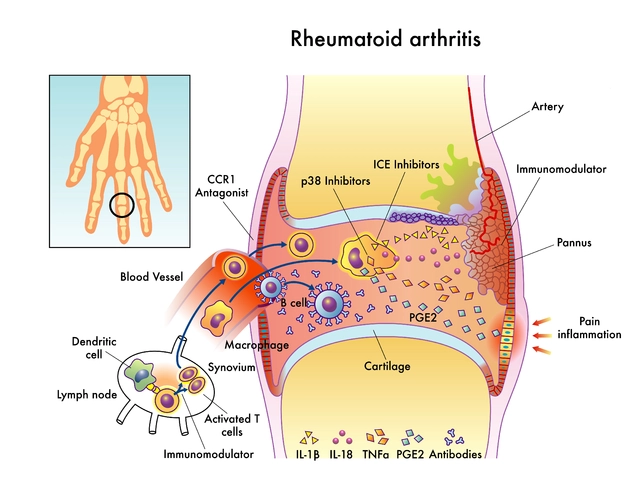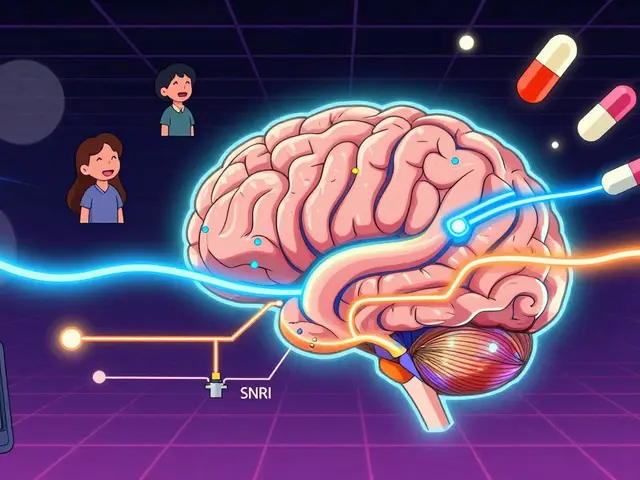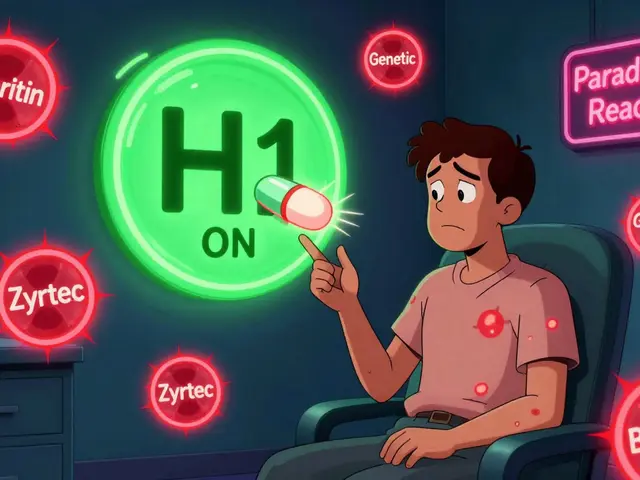Introduction to Atenolol and Depression
As a blogger who has experienced depression, I know how important it is to be cautious when taking medications that can potentially affect my mental health. One such medication is atenolol, a beta-blocker commonly prescribed for high blood pressure and heart issues. In this article, I will explore the connection between atenolol and depression, providing you with the information you need to make informed decisions about your health.
Understanding Atenolol and Its Uses
Atenolol is a beta-blocker that works by blocking the effects of certain chemicals, such as adrenaline, on your heart and blood vessels. This helps to lower your heart rate, blood pressure, and strain on your heart. It is commonly prescribed to treat conditions such as high blood pressure, angina (chest pain), and irregular heartbeat.
While atenolol can be an effective treatment option for these physical health issues, it is essential to consider the potential impact on your mental health, specifically regarding depression.
Atenolol and Depression: The Connection
There have been numerous studies and anecdotal reports suggesting a potential connection between beta-blockers, including atenolol, and depression. The exact mechanism behind this connection is not fully understood, but it is believed that beta-blockers may interfere with the brain's levels of serotonin and norepinephrine, two neurotransmitters that play a crucial role in regulating mood.
However, it is essential to note that the evidence on this connection is mixed. Some studies have found a link between beta-blocker use and increased depression risk, while others have not. Therefore, further research is needed to understand this relationship fully.
Recognizing the Signs of Depression
Whether you are taking atenolol or not, it is crucial to recognize the signs of depression and seek help if needed. Symptoms of depression can vary, but may include:
- Persistent feelings of sadness, hopelessness, or emptiness
- Loss of interest or pleasure in activities you once enjoyed
- Changes in appetite or weight
- Difficulty sleeping or sleeping too much
- Feeling tired or lacking energy
- Feelings of worthlessness or guilt
- Difficulty concentrating, making decisions, or remembering things
- Physical symptoms such as headaches, stomachaches, or back pain
- Thoughts of death or suicide
If you experience any of these symptoms, it is essential to talk to your doctor or a mental health professional for support and guidance.
Atenolol and Depression: Risk Factors to Consider
While the connection between atenolol and depression is not fully understood, there are certain factors that may increase your risk of experiencing depression while taking this medication. These risk factors may include:
- A personal or family history of depression
- Existing mental health conditions such as anxiety or bipolar disorder
- High levels of stress or recent traumatic events
- Substance abuse or addiction
- Other medications that may interact with atenolol and increase depression risk
If you have any of these risk factors, it is crucial to discuss them with your doctor before starting or continuing atenolol treatment.
Talking to Your Doctor About Atenolol and Depression
If you are concerned about the potential connection between atenolol and depression, it is essential to have an open and honest conversation with your doctor. They can help you weigh the potential risks and benefits of atenolol treatment and determine whether this medication is the best option for your specific situation.
Your doctor may also recommend alternative treatment options or closely monitor your mental health while you are taking atenolol to ensure that any signs of depression are addressed promptly.
Managing Depression While Taking Atenolol
If you are taking atenolol and experiencing symptoms of depression, there are steps you can take to manage your mental health effectively. These may include:
- Seeking therapy or counseling to address underlying issues and develop coping strategies
- Engaging in regular physical activity, which can help improve mood and overall mental health
- Ensuring you are getting enough sleep and practicing good sleep hygiene
- Connecting with friends, family, or support groups to help combat feelings of isolation
- Considering medication adjustments or additional treatments under the guidance of your doctor
Remember, it is essential to prioritize your mental health and reach out for help if you need it.
Conclusion: Atenolol and Depression
While the connection between atenolol and depression is not fully understood, it is essential to be aware of the potential risks and take steps to monitor and manage your mental health while taking this medication. By doing so, you can ensure that you are making the best decisions for your overall health and well-being.
Always remember to consult with your doctor and discuss any concerns you may have. They can provide personalized guidance and support to help you navigate the complexities of managing both your physical and mental health.






Abhishek Kumar
May 13, 2023 AT 21:22Beta blockers can influence serotonin levels.
hema khatri
May 17, 2023 AT 08:42Atenolol may lower heart rate but also blunt mood! It blocks adrenaline, which can dampen emotional spikes! Some patients report feeling flat after weeks of use! If you notice a dip in energy, it might be the drug! Keep an eye on any persistent sadness and tell your doctor promptly!
Jennell Vandermolen
May 20, 2023 AT 20:02Monitoring mood while on atenolol is a smart move. If you feel any shift in emotions, jot it down and share with your healthcare provider. A gentle conversation about side‑effects often leads to the right adjustments. You deserve both heart health and mental well‑being.
Mike Peuerböck
May 24, 2023 AT 07:22Indeed, atenolol functions by dampening the sympathetic nervous system, which can have downstream effects on neurotransmitter balance. While its primary goal is to reduce cardiac workload, the attenuation of catecholamine signaling may indirectly influence serotonin synthesis pathways. Clinical observations have noted a subset of patients describing a muted affect or reduced enthusiasm after initiating therapy. This is not merely anecdotal; several small-scale studies have documented modest increases in depressive symptom scores among beta‑blocker users. It is crucial, however, to differentiate drug‑induced mood changes from the natural course of underlying mood disorders. A thorough baseline psychiatric evaluation prior to prescribing can provide a reference point for later comparisons. Moreover, the dose‑response relationship remains ambiguous-some individuals tolerate low doses without issue, whereas higher doses may amplify neurochemical suppression. Lifestyle interventions, such as regular aerobic exercise, can counterbalance some of the depressive propensity by naturally boosting endorphin levels. Nutrition also plays a role; omega‑3 fatty acids and B‑vitamins support neuronal health and may mitigate adverse mood effects. If a patient experiences persistent low mood, clinicians might consider switching to an alternative antihypertensive class, such as ACE inhibitors or calcium channel blockers, which have a more neutral psychiatric profile. Collaborative care involving cardiologists, primary care physicians, and mental health specialists ensures a holistic approach. Open communication empowers patients to voice concerns without fear of being dismissed. Ultimately, the decision to continue atenolol should weigh cardiovascular benefits against individual psychological tolerance. Remember, medication is just one piece of the health puzzle; supportive therapy, social connection, and self‑care remain pivotal.
Simon Waters
May 27, 2023 AT 18:42Some people think pharma pushes atenolol to hide side‑effects, but the data are mixed. Still, it's wise to stay skeptical and ask for full study reports. Keep your doctor informed about any mood shifts.
Vikas Kumar
May 31, 2023 AT 06:02Our Indian doctors know the balance between heart meds and mental health. We cannot let foreign drug giants dictate our treatment without proper scrutiny! If atenolol harms mood, demand alternatives that respect both body and mind.
Celeste Flynn
June 3, 2023 AT 17:22When evaluating the atenolol‑depression link, consider the pharmacodynamics. Beta‑1 selectivity reduces peripheral adrenergic activity, which may lower the availability of norepinephrine in the central nervous system. Reduced norepinephrine can manifest as decreased motivation or anhedonia. Additionally, some patients have genetic polymorphisms in the CYP2D6 enzyme that affect drug metabolism, potentially leading to higher plasma concentrations and greater CNS exposure. Monitoring plasma levels, when feasible, can help differentiate pharmacologic effects from coincidental mood changes. It's also helpful to use standardized scales like PHQ‑9 before and after starting therapy to objectively track depressive symptoms.
Shan Reddy
June 7, 2023 AT 04:42Good point about checking mood changes early. I’d add a simple daily mood log can be really useful.
CASEY PERRY
June 10, 2023 AT 16:02Atenolol’s beta‑1 blockade reduces myocardial oxygen demand; however, its central effects remain low‑grade. Clinical vigilance is advised.
Naomi Shimberg
June 14, 2023 AT 03:22While many accept atenolol as safe, the literature does reveal non‑trivial incidences of depressive episodes. One must not dismiss these findings as mere placebo effects. A rigorous risk‑benefit analysis should precede any prescription.
kenny lastimosa
June 17, 2023 AT 14:42Philosophically, a drug that calms the heart may also quiet the spirit. Balance is essential; otherwise, we trade one turmoil for another.
Heather ehlschide
June 21, 2023 AT 02:02Practical tip: if you start atenolol, schedule a follow‑up within two weeks to discuss any mood changes. Also, keep a list of all medications you’re taking; interactions can sometimes exacerbate depressive symptoms.